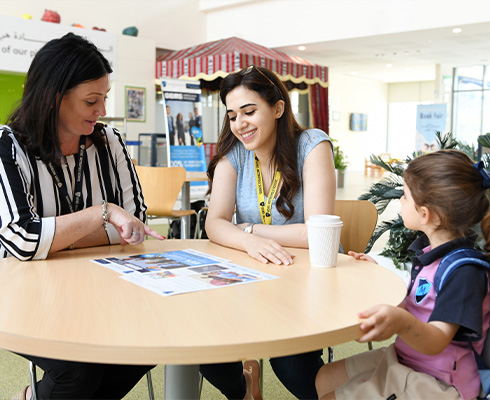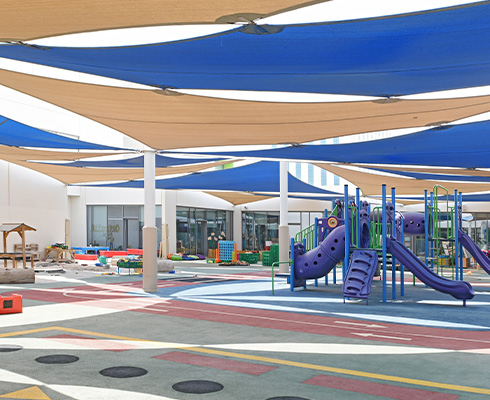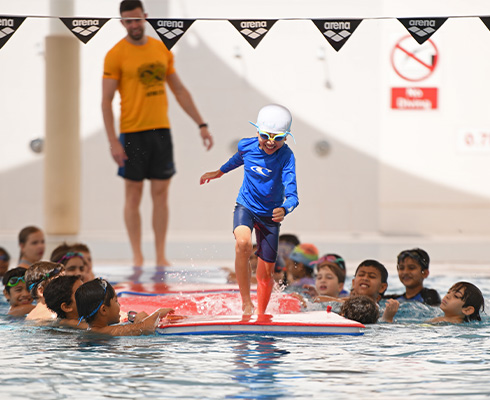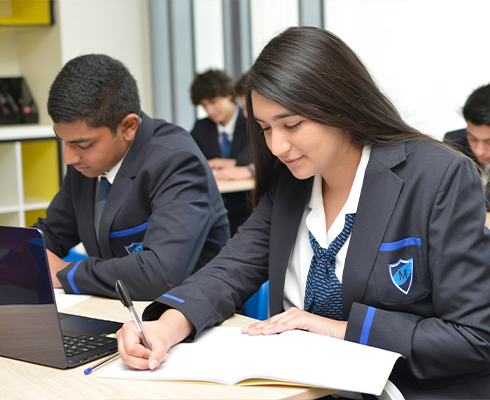Junior School - Values School
Where values build characterYear 3 to 6
The Junior School, also known as the Values School, which includes Year 3-6 (age 7-11 years), offers children a high-quality education in a friendly and supportive learning environment. We instil in our young learners the core values and character attributes essential for their future triumphs. We build their confidence and foster values such as compassion, empathy, kindness and respect while promoting their leadership skills.
We believe it is essential that all pupils acquire a good grasp of English, Mathematics, Science and Humanities as well as improving their emotional intelligence. Arabic, Islamic, Art, Computing, Languages, Music, Drama and PE are taught by subject specialists who are experienced in teaching primary-aged pupils.
Leadership, values and student voice is at the heart of what we do. The SSAT Pupil Leadership Award, which is a programme that focuses on core leadership skills provides students an opportunity to develop as leaders. The elective options for Spanish and French allows for students to become leaders of their own learning and begin to make informed choices about their future pathways. Through our commitment to ensuring every child has the responsibility and experience of a leadership role, members of the Junior Student Leadership Team work on key priorities in conjunction with the school’s Senior Leadership Team to develop the school from a student perspective.
We believe that student self-confidence and independence from an early age is important in the development of leaders and helps prepare students for the next stage in their lives. The Junior Duke Award will give students the opportunity to complete a range of personal challenges including First Aid, cookery, domestic challenges, caring for others, playing chess and many other fun things! Enterprise projects, TED style talks and presentations encourage confident public speakers and develop pupils’ entrepreneurial skills.
The four years of developing pupil voice and confidence building through a values-based education will prepare students in their transition to the Prep School where they will further establish themselves as authentic and ethical leaders.



Simon Longdon
Head of Values School
Meet The Head of Values school
I enjoy working collaboratively to foster authentic, purposeful and engaging learning experiences to equip our students for the next stage of their education and instill a lifelong love for learning within them'.
Explore the Junior Curriculum
Our curriculum focuses on several different areas below
-
Spoken Language
At all ages, the ability to listen and respond appropriately to others is a critical life-skill and key to accessing and developing children’s learning in school and the world around them.
We use talk in the classroom daily, we model and teach children to articulate their answers, questions, opinions, arguments, descriptions and explanations, as well as express their feelings.
We encourage children to use the English language articulately in order to communicate with their audience effectively. We regularly use talk to clarify and solidify thinking and learning through cooperative learning structures in the classroom.
We provide real life contexts throughout the curriculum that provide opportunities for children to adapt their tone and style for a particular audience, from presentations to performances and role plays to debates. Talk is very much seen as a key to success.
-
Reading
At GEMS Metropole we have a passion for books and the written form; this is at the heart of our teaching from early reading until the children are ready for secondary school.
We believe that children must develop a love for reading in order to motivate and develop their own reading fluency and comprehension skills. Children at GEMS Metropole are able to access all that books have to offer through high-quality shared class texts and book talk that give them opportunities to develop their skills as well as a vivid imagination and advanced vocabulary. Children can choose their own book to take home from an array of individually levelled reading books, including books from the Oxford Reading Tree, ORT Phonics, Usborne First Reading and Project X reading schemes. This is encouraged across the school as the most useful and enjoyable element of home learning.
GEMS Metropole has three well-stocked libraries where children visit regularly and can relax and enjoy a book. Our children read regularly to teachers, learning support assistants and volunteers in a group or 1:1 environment, but also relish the opportunity to hear a magical tale read by their teacher.
-
Writing
At GEMS Metropole, the English curriculum is based upon the National Curriculum of England with some adaptations to suit the needs of our students in the UAE and focuses on spelling and transcription, vocabulary, grammar, punctuation, handwriting and composition. English writing lessons are taught using the 'The Write Stuff' approach by Jane Considine to bring clarity and consistency to the mechanics of writing and to enable our students to write effectively and coherently. In 'The Write Stuff' approach to writing, children explore high-level, rich vocabulary and are taught grammar in context through different writing lenses on. There are three lenses used to support children in their writing: Fantastics – ideas for writing; Grammartastics – tools for writing; Boomtastics – writing techniques. With this approach, pupils will write for a range of purposes. They will use their vast knowledge of vocabulary to excite, inform and entertain the reader. Pupils will also be able to understand and use a range of grammatical devices.
-
Maths
The British Curriculum focuses on teaching of the following three fundamentals:
- Becoming fluent in the fundamentals of mathematics, including through varied and frequent practice with increasingly complex problems over time, so that pupils develop conceptual understanding and the ability to recall and apply knowledge rapidly and accurately.
- Reasoning mathematically by following a line of enquiry, conjecturing relationships and generalisations, and developing an argument, justification or proof using mathematical language.
- Solving problems by applying their mathematics to a variety of routine and non-routine problems with increasing sophistication, including breaking down problems into a series of simpler steps and persevering in seeking solutions.
Across the school, we teach Maths in a practical way giving children opportunities to explore number relationships using models, images and manipulatives including Numicon, Dienes and Cuisenaire Rods. Once children have a secure understanding of mathematical concepts, we challenge them to solve more abstract and complex problems through offering a variety of rich, mathematical tasks as opposed to moving them on to new content. Application in a range of concepts, reasoning and exploring mathematical ideas are a key part of learning and challenge for our children.
In lessons we link maths concepts to the real world beyond the classroom so that children develop an appreciation of the application of maths for future employment and real life. We don’t use a particular ‘maths scheme’ as such, but we do use a variety of published and online resources including White Rose. Our teachers are very skilled at structuring lessons and tailoring material to embed learning and provide stretch and challenge.
-
Science
Science at GEMS Metropole contributes significantly to pupils’ enjoyment and understanding of the world and their place within it. This awareness is to extend as far as the pupil is able from being aware of themselves and their immediate environment through to an appreciation of the natural and man-made world within Science. This area is important as it contributes to a broad, balanced, differentiated, and relevant curriculum but will also link across the curriculum.
Science is made accessible to all pupils through a focus on practical work, first-hand experience and special events designed to inspire and engage learners. Teaching key skills such as making observations, predictions and evaluation of first hand observations are of equal importance to knowledge and understanding.
In the primary school, science is taught by class teachers and is incorporated throughout other subjects and the relevant topic at the time. This ensures a holistic approach in the acquisition of scientific skills and knowledge.
-
Moral Social and Cultural Studies
At GEMS Metropole we follow the Moral, Social and Cultural Studies (MSC) curriculum as published by the Ministry of Education in the UAE. This curriculum focuses on three domains; moral, social and cultural. There are 10 strands that fit into these domains; Character morality, individual and community, history, geography, sociology, economics, information literacy, information processing, heritage and civics. MSCs outcomes are incorporated across all areas of the curriculum from Year 2 to Year 6 for 40 minutes each week. In addition, some of the time will be integrated throughout discovery lessons when necessary. When teaching MSC, we aim to contribute to the making of better global citizens through the development of human capital capabilities, promoting the values of tolerance and respect and being responsible for looking after the place where they live as well as the wider world.
We provide students with an awareness of the world around them to help them navigate and be successful in the future, making informed and reasoned decisions as members of a tolerant and culturally diverse society. This will include deepening their understanding of social, political and economic systems. At the end of each term, students will complete a project to enhance their MSCs knowledge and skills. -
Leadership Curriculum
Junior School Ethical Leadership Curriculum
Leadership curriculum
Through a rich and inspiring leadership curriculum, students in the junior school will be exposed to and have opportunities to develop their leadership skills as well as lead on their own projects across the year groups. Students will have one lesson a week which will be dedicated to the core leadership skills. Within these lessons, students will learn what a leader is, what it means to be a leader and ultimately, how to be an effective leader. Each term, the students will have a leadership day. This will involve a range of tasks from team building exercises, developing problem solving, social responsibility tasks and leading other year groups in activities. At the end of every academic year there will be a leadership conference lead by the year 6 students which will showcase all of the work the students have done throughout the year. Leadership Specialism Ambassador (one teacher per year group) The main role of the Leadership Specialism Ambassador is to ensure that leadership is at the heart of teaching and learning for our junior students, and that teachers seize opportunities to promote leadership skills through our curriculum. Our ambassadors are role models and lead practitioners in and around the school through their involvement in leadership activities and driving forward the leadership curriculum within their year group.
Curriculum Overview
Year 3 - Why I want to be a leader
Term 1 - What is a leader? Students will be introduced to the core skills of leadership (Management, Endurance, Teamwork, Responsibility, Organisation, Presentation, Optimism, Loyalty and Empowerment (METROPOLE)).
Term 2 - How does a leader lead? Leading by example. Students will explore ways to lead others by setting a good example to all. This unit will involve an element of social responsibility in leading a group to do something to support others.
Term 3 - What type of leader can I be? Students will explore different leadership roles within the school community and beyond. Students will work together to create a leadership portfolio to share at the summer leadership conference.
Year 4 – If I were the leader
Term 1 - How I can lead? Vision building - Leaders set direction and help themselves and others to do the right thing to move forward. To do this they create an inspiring vision, and then motivate and inspire others to reach that vision. Students will explore different leadership visions and create their own vision.
Term 2 - How can a leader be more effective? During this term, students will explore a range of team building activities and think about how small changes can make a big difference to the outcome.
Term 3 – How can I make an impact? Students will explore what it is to make an impact as a leader. Students will lead on a range of social responsibility projects and learn that actions speak louder than words!
Year 5 - When I am the leader
Term 1 - What will I do as a leader? Further exploration into the different types of leadership roles in the work place.
Term 2 – Building on term 1, students will link with different leaders from across the globe and invite them to come into school or speak to them online to share their experiences as a leader. From Mr Nav to the president of the United States – the opportunities are endless!
Term 3 – Create a leadership jobs fair to be shared at the student leadership conference. Students will pull together the work throughout the year to develop a portfolio of information to share with other learners about the potential leadership opportunities on offer to them in the wider world.
Year 6 – I am a leader!
Term 1 – Effective leadership – influencing others to get success for your business. Students to create their own business model and think about how they will lead. They will develop skills such as budgeting and strategic planning to support the growth of their potential business. Students will have the opportunity to present their business ideas in a ‘Dragons Den’ type situation with local business leaders to compete for the best business idea.
Term 2 – Leadership programme for younger students – through masterclass, year 6 students will lead on a range of activities for the infant students.
Term 3 – Leadership conference – organise a conference to showcase all of the Junior Leadership work from across the year. Students will share their business proposals All students will have a leadership portfolio which will move up with them through the year groups e.g. purple A3 landscape books
To showcase the work form the year, Year 6 students will create a leadership conference in which there will be opportunities for students to organise, support others and share their learning from their leadership lessons.
Junior parents will be invited to the conference to the vast array of leadership skills and opportunities on offer the students at Metropole.
Year group Term 1A Term 1B Term 2A Term 2B Term 3A Term 3B 3
Why I want to be a leader…
Key skill: Compassion.
Overview: What makes a good leader? Overview of different tyoes of leaders in school community, local community and global community.
Key skill: Respect, compassion.
Overview: What is responsibility? Different types of responsibility for different ages and then linking to different careers.
Key skill: Hardworking.
Overview: What makes a good team? Leadership day – team building tasks. Roles of team members.
Key skill: Empathy, Agile.
Overview: Why is communication important? Focus on how you can effectively communicate with others. Skills of a good communicator. Students to present.
Key skill: Empathy, Compassion
Overview: Creating a campaign to support K9 dog shelter. Social responsibility project.
Key skill: Kindness, Hardworking.
Overview: Looking back at the impact and SWAN feedback as a group. Parents visit – share leadership portfolios.
4
If I were the leader… Empathy Respect Kindness Compassion Hardworking Agile
Key skill: Hardworking and respect.
Overview: What makes a good leader? What can we learn from leaders? What is a vision? Overview of different visions e.g. within school, local business or global
Key skill: Empathy, research, compassion, respect, responsibility.
Overview: Why are people’s ideas important? (Electricity link) Team project for winter fair with new vision (sell something)
Key skill: Empathy, teamwork, responsibility, agile.
Overview: Roles of a TEAM! - link to exploration Why do companies need a vision? Team building activities leading to designing own for other classes
Key skill: Research, presentation, motivation, hardworking.
Overview: Make a change – visitor - Waitrose trip How could you be an effective leader? Market research/ parent visit What can we change the world?
Key skill: Empathy, research/ Teamwork, empathy.
Overview: Social responsibility project Romans – How did their leadership enable their survival? How can you make an impact?
Key skill: Reflection, empathy.
Overview: Social responsibility project Atlantis Link - What can you do/create that will stand the test of time?
5
When I am the leader…
Key skill: Hard-working Respect.
Overview: What will I do as leader? What are the responsibilities of a good leader? What leadership opportunities are available for me at school?
Key skill: Compassion, Hard-working.
Overview: What can we I do to become a leader at GEMS metropole? What makes a good application to become a leader? What qualities do we need?
Key skill: Empathy Respect.
Overview: Looking at what makes an effective leader. Compare and contrast famous leaders in the world. How can we learn from an effective leader? Talk from a leader
Key skill: Hard-working Kindness.
Overview: Selling items at the spring market – leadership roles in a group. Take on from last term, how can they be an effective leader
Key skill: Agile Empathy.
Overview: Titanic unit – who was responsible? Debate used from topic lessons. Trials?
Key skill: Organisation Teamwork Presentation Hard-working.
Overview: At the end: Jobs fair at the leadership conference Have you thought about being a leader for NASA, Captain of a ship? Why do you think you’d be good? What do you need to do?
6
I am a leader!
Key skill: Empathy, Kindness, Respect.
Overview: How will be I an effective leader? (Solar panel project).
Key skill: Hardworking, Respect, Agile.
Overview: How will engage an audience as a leader? Create presentation and pitch to Mr Nav.
Key skill: Hardworking, Agile, Respect, Compassion.
Overview: How will I utilise my leadership skills to take ownership of a project? Roles in a team (F1 project), team vision, active listening.
Key skill: Compassion, Respect, Hardworking, Kindness.
Overview: How will I inspire future leaders? Work with Year 3 buddy to support for MTS Talks.
Key skill: Empathy, Kindness, Respect, Kindness.
Overview: How can I better myself as a leader? Adam Burfield Award.
Key skill: Empathy, Kindness, Respect, Kindness, Compassion, Agile.
Overview: How can I effectively present my project to an audience? Burfield Award.
-
Subject Coverage
-
Junior Subject Coverage
Year 3 to Year 6
Age: 7 years old to 10 years old
The foundation of learning has already been laid by Key Stage 2, and students begin to learn at a higher level and apply the knowledge they have gained in their earlier years. Students have a better understanding of their own identities and likes, and they also begin to be curious about areas they are interested in discovering.
Year 3
Year 4
Year 5
Year 6
- English
- Mathematics
- Science
- Computing and Innovation
- Art and Design
- Design Technology
- Performing Arts (music and drama)
- Physical Education (PE)
- Modern Foreign Languages (French and Spanish)
- Arabic
- Islamic Studies
- Moral, Social and Cultural Studies
- Values in action
- English
- Mathematics
- Science
- Computing and Innovation
- Art and Design
- Design Technology
- Performing Arts (music and drama)
- Physical Education (PE)
- Arabic
- Islamic Studies
- Moral, Social and Cultural Studies
- Values in action
Option: French or Spanish
- English
- Mathematics
- Science
- Computing and Innovation
- Art and Design
- Design Technology
- Performing Arts (music and drama)
- Physical Education (PE)
- Arabic
- Islamic Studies
- Moral, Social and Cultural Studies
- Values in action
Option: French or Spanish
- English
- Mathematics
- Science
- Computing and Innovation
- Art and Design
- Design Technology
- Performing Arts (music and drama)
- Physical Education (PE)
- Arabic
- Islamic Studies
- Moral, Social and Cultural Studies
- Valued in action
Option: French or Spanish
Students are encouraged to find solutions by applying developed skills and knowledge. This introduction to independent learning gives them the opportunity to explore possibilities.
Curriculum Overviews
-
Junior Curriculum Overviews
-
Year 3 Term 1 A
-
Year 4 Term 1 A
-
Year 4 Term 1 B
-
Year 4 Term 2 A
-
Year 4 Term 2 B
-
Year 4 Term 3 A
-
Year 4 Term 3 B
-
Year 5 Term 1 A
-
Year 5 Term 1 B
-
Year 5 Term 2 A
-
Year 5 Term 2 B
-
Year 5 Term 3 A and B
-
Year 6 Term 1 A
-
Year 6 Term 1 B
-
Year 6 Term 2 A
-
Year 6 Term 2 B
-
Year 6 Term 3 A
-
More To Explore
-

-

Facilities
We have a state of the art campus and facilities which create a rich learning environment.
-

Extra Curricular Activities
We offer programs that introduce students to a variety of exciting and enriching experiences.
-

School Policies
Policies are important as they help a school establish rules and procedures and create standards of quality for learning and safety.
